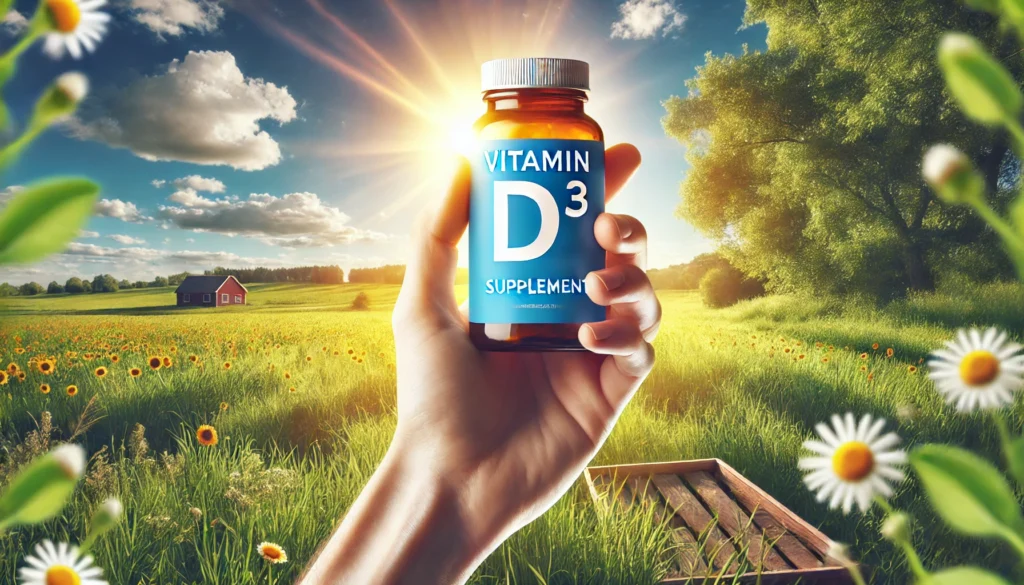In this article, we will explore the best Vitamin D supplements for mood enhancement, focusing on their efficacy in alleviating symptoms of depression and anxiety.
You may also like:Exploring Magnesium and B12 for Anxiety Relief

Understanding Vitamin D’s Role in Mental Health
Vitamin D’s connection to mental health is a subject of both historical curiosity and modern scientific inquiry. It is produced by the body in response to sunlight exposure, thus earning the moniker “sunshine vitamin.” While traditionally associated with bone health, recent studies suggest a correlation between Vitamin D levels and mood disorders.
Historical Context
Historically, Vitamin D has been linked to rickets, a bone disease caused by Vitamin D deficiency. This deficiency led to a growing awareness of the importance of Vitamin D in skeletal development. However, as scientific understanding evolved, so did the recognition of Vitamin D’s broader physiological roles, including its potential impact on mood regulation. Researchers began to explore the broader implications of Vitamin D deficiency beyond bone health, sparking interest in its role in various bodily functions.
Evolution of Scientific Understanding
The progression from a skeletal focus to recognizing Vitamin D’s neurological implications marks a significant shift in scientific perspective. Early observations hinted at a connection between sunlight exposure and mood enhancement, which prompted further research. This growing body of evidence suggested that Vitamin D might influence neurotransmitter activity, paving the way for more in-depth studies. As these studies advanced, the understanding of Vitamin D’s interaction with the brain expanded, highlighting its potential role in mental health.
Modern Research on Vitamin D and Mood
Current research indicates that Vitamin D receptors are present in brain regions involved in mood regulation, such as the prefrontal cortex. This discovery underscores a potential pathway through which Vitamin D might influence mood. Moreover, Vitamin D deficiency has been associated with an increased risk of depression and anxiety, though the precise mechanisms remain under investigation. Studies have demonstrated that individuals with lower Vitamin D levels often exhibit more severe symptoms of mood disorders. Additionally, some clinical trials have shown that Vitamin D supplementation can lead to improvements in mood, further supporting its potential role in mental health.
Vitamin D3: The Preferred Form
When considering Vitamin D supplements, it is essential to understand the types available. Vitamin D exists in two primary forms: Vitamin D2 (ergocalciferol) and Vitamin D3 (cholecalciferol). Both forms can enhance Vitamin D levels, but Vitamin D3 is more effective in raising and maintaining those levels.
Bioavailability and Effectiveness
Vitamin D3 is often recommended for its superior bioavailability and efficacy. Its chemical structure is more similar to the form of Vitamin D produced by the body, allowing for better absorption and utilization. For those struggling with mood disorders, determining the right dosage is crucial. While individual needs may vary, a common dosage for mood enhancement ranges from 1,000 to 5,000 IU daily. However, it is advisable to consult with a healthcare professional to personalize the dosage based on specific needs and existing Vitamin D levels.
Choosing the Right Form
The choice between Vitamin D2 and D3 supplements should be informed by their differences. Vitamin D3 is derived from animal sources, such as lanolin or fish oil, while Vitamin D2 is often sourced from plants or fungi. The more potent form, D3, is generally preferred for mood enhancement due to its longer-lasting effects in the body. Understanding these distinctions helps individuals make informed decisions about their supplementation strategy.
Dosage Recommendations
Determining the correct dosage of Vitamin D3 is crucial for achieving optimal results. Factors such as age, body weight, geographic location, and baseline Vitamin D levels can influence the required dosage. It’s important to monitor Vitamin D levels through blood tests and adjust the supplementation accordingly. Consulting with a healthcare provider ensures that the dosage is safe and effective for individual needs.

Best Vitamin D Supplements for Mood Enhancement
When selecting a Vitamin D supplement, factors such as bioavailability, dosage, and additional ingredients must be considered. Here are some top-rated Vitamin D supplements renowned for their mood-enhancing properties:
1. NatureWise Vitamin D3
NatureWise Vitamin D3 stands out for its high potency and organic olive oil base, which enhances absorption. This supplement is particularly beneficial for individuals with limited sun exposure, offering 5,000 IU per serving. The use of organic olive oil not only supports better absorption but also provides a natural source of healthy fats, which can further support mood enhancement.
2. Nordic Naturals Vitamin D3
Nordic Naturals is celebrated for its commitment to purity and sustainability. Their Vitamin D3 supplement is sourced from cholecalciferol, derived from lanolin, and offers a balanced 1,000 IU dose, ideal for daily maintenance. The brand’s focus on sustainability ensures that their products are environmentally friendly, appealing to consumers who prioritize ethical sourcing.
3. Thorne Research Vitamin D/K2
Thorne Research combines Vitamin D3 with Vitamin K2, a pairing that supports bone and cardiovascular health while potentially enhancing mood. This combination is particularly beneficial for individuals seeking a holistic approach to wellness. Vitamin K2 helps direct calcium to the bones, minimizing the risk of arterial calcification and supporting overall cardiovascular health.
4. Garden of Life Vitamin Code Raw D3
Garden of Life offers a raw, whole food-based Vitamin D3 supplement, enriched with probiotics and enzymes for optimal digestion and absorption. This formulation provides 5,000 IU, suitable for those needing a higher dose. The inclusion of probiotics and enzymes aids in gut health, which is increasingly recognized as a factor in mental wellness.
5. Pure Encapsulations Vitamin D3
Pure Encapsulations is known for hypoallergenic, pure supplements. Their Vitamin D3 is free from common allergens and additives, offering a straightforward solution for mood support with a 1,000 IU dosage. This makes it an excellent choice for individuals with dietary restrictions or sensitivities.
Can Vitamin D Help with Anxiety?
The question of whether Vitamin D can help with anxiety is a topic of ongoing research. While more studies are needed to draw definitive conclusions, initial findings are promising. Some studies suggest that Vitamin D supplementation may alleviate anxiety symptoms, particularly in individuals with pre-existing deficiencies.
Understanding Anxiety and Vitamin D
Anxiety disorders affect millions worldwide, and understanding the role of Vitamin D in managing these conditions is crucial. Some research indicates that Vitamin D may influence the production of neurotransmitters, such as serotonin, which play a key role in mood regulation. By supporting neurotransmitter function, Vitamin D could potentially help reduce anxiety symptoms.
Integrating Vitamin D into an Anxiety Management Plan
Incorporating Vitamin D supplements into an anxiety management plan can be beneficial, but it is important to approach this holistically. Adequate sunlight exposure, a balanced diet, regular exercise, and mindfulness practices are equally important for overall mental well-being. Combining these lifestyle strategies with Vitamin D supplementation may enhance the overall effectiveness of anxiety management efforts.
Practical Advice for Anxiety Management
For those considering Vitamin D supplementation as part of their anxiety management strategy, it’s important to consult with a healthcare professional. Identifying and addressing any underlying deficiencies is a critical first step. Additionally, tracking mood changes and anxiety symptoms can help determine the effectiveness of the supplementation and guide any necessary adjustments.

Conclusion
Vitamin D’s potential role in mood enhancement offers a compelling avenue for those seeking natural remedies for depression and anxiety. While supplementation can be an effective strategy, it is essential to consider individual needs and consult with a healthcare professional for personalized guidance. Understanding the nuances of Vitamin D’s impact on mental health is crucial for those looking to optimize their emotional well-being.
As the scientific community continues to explore the intricate relationship between Vitamin D and mental health, one thing is clear: the sunshine vitamin holds promise as a valuable ally in the quest for emotional well-being. By choosing high-quality Vitamin D supplements and integrating them into a comprehensive wellness plan, individuals can harness the benefits of this vital nutrient to support mood enhancement and overall mental health.
Further Reading:
What to Know About Vitamin D and Mental Health
What Supplements Are Good for Depression?
Vitamin D supplementation may help reduce depressive symptoms, study finds
Important Note: The information contained in this article is for general informational purposes only, and should not be construed as health or medical advice, nor is it intended to diagnose, prevent, treat, or cure any disease or health condition. Before embarking on any diet, fitness regimen, or program of nutritional supplementation, it is advisable to consult your healthcare professional in order to determine its safety and probable efficacy in terms of your individual state of health.
Regarding Nutritional Supplements Or Other Non-Prescription Health Products: If any nutritional supplements or other non-prescription health products are mentioned in the foregoing article, any claims or statements made about them have not been evaluated by the U.S. Food and Drug Administration, and such nutritional supplements or other health products are not intended to diagnose, treat, cure, or prevent any disease.


